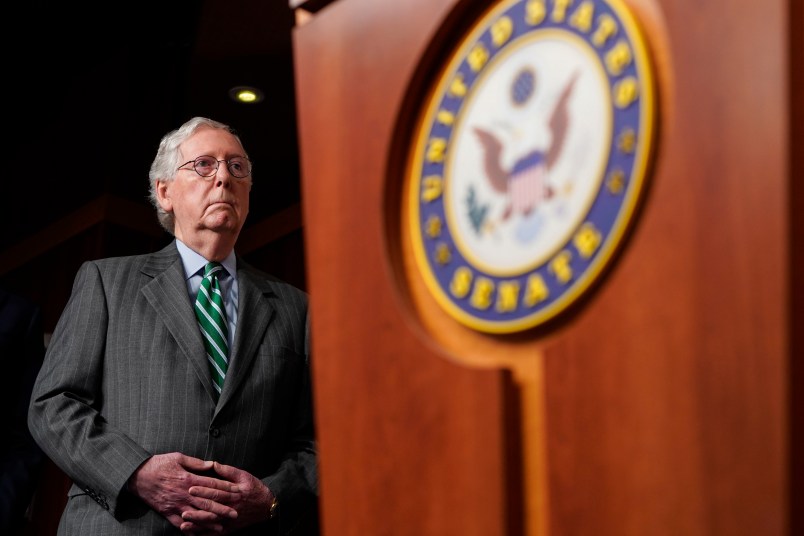Ever since Republicans realized that Democrats still intended to go ahead with their reconciliation infrastructure bill in lockstep with the bipartisan deal, they’ve been searching for a rationale to oppose the arrangement.
The real reason they don’t like it is clear, and was even stated publicly by Sen. John Thune (R-SD) earlier this month: GOP senators were hoping a bipartisan, scaled-down infrastructure bill would then lessen moderate Democrats’ incentive to cooperate on a progressive, much larger infrastructure bill, likely to pass on party lines through budget reconciliation later this year. Defections from centrist Democrats would kill that larger package, taking down key components of President Joe Biden’s agenda.
For the public-facing argument, though, Republican senators have settled on faux fury that they’ve been hoodwinked by Democrats’ insistence on moving the two bills — the bipartisan deal and the reconciliation package — in tandem.
“Republicans have been negotiating in bipartisan good faith to meet the real infrastructure needs of our nation,” Senate Minority Leader Mitch McConnell (R-KY) said in a Monday statement. “The President cannot let congressional Democrats hold a bipartisan bill hostage over a separate and partisan process.”
In reality, Democrats’ intention to move these two pieces of legislation together has never been a secret. For Democratic leaders, it’s the only way to get both bills passed: it doesn’t give moderate Democrats the chance to back out of reconciliation after notching a bipartisan victory, and it assures progressives that a vote for the bipartisan deal doesn’t preclude passing its much more ambitious counterpart.
And Republicans knew it.
At a June 15 press conference, McConnell was explicitly asked if it gave him “pause” that Democrats intended to pursue their own agenda after reaching the bipartisan deal.
“Well, I think the majority leader has indicated there will be a reconciliation effort,” McConnell said. “I think what they’re wrestling with is what will it contain. So we are anticipating, at some point, getting a reconciliation bill.”
He’s not the only Republican on the record giving a clear-eyed statement about how these two bills would work.
Sen. Roy Blunt (R-MO) gave Democrats his blessing for a reconciliation bill in early April.
“My advice to the White House has been, take that bipartisan win, do this in a more traditional infrastructure way and then if you want to force the rest of the package on Republicans in the Congress and the country, you can certainly do that,” he said on Fox News.
Sen. Rob Portman (R-OH), one of the negotiators, acknowledged on CNBC Friday that Democrats always intended to do reconciliation too, also tipping his hand on the GOP strategy in cooperating on the bipartisan deal to sink that reconciliation package later.
“Democrats were going to move forward with a broad reconciliation bill with a lot of tax increases, in fact, the most in the history of our country, regardless,” he said. “My sense is that infrastructure, if we can get this done separately, being pulled out of it, makes it a less attractive package for a lot of the more moderate Democrats.”
Even way back in mid-May, a whole different set of Republican negotiators — since replaced after those talks stalled out — acknowledged the legitimacy of Democrats using reconciliation to pass more of their own infrastructure priorities after Biden told them he planned to.
“I mean, why wouldn’t we work with the President of the United States to improve our infrastructure or make any other improvements in the country?” Sen. Shelley Moore-Capito (R-WV), previously the head GOP negotiator, said according to an ABC reporter. “I mean, we know that they have that option,” she said of reconciliation, adding: “We used that option in 2017.”
Republicans may have a political incentive to try to deprive Biden of scoring both a bipartisan victory and historic and progressive partisan achievement in one fell swoop. But pretending like their opposition to the game plan is grounded in Democrats’ duplicitous negotiating is simply, and provably, not true.







Well sure, but if you can dupe CNN, the NYT et al, it doesn’t matter if you’re lying about this and every other living thing. Controlling the narrative is all that matters.
The Five Stages of Beltway Press Grief:
(h/t Kübler-Ross)
Doubt their editors were duped too. The hard truth is US media tends to go with the noise and the Republicans are very loud.
Oddly enough, stages 1 through 4 are the exact same as the “former Trump administration employee’s attempts to regain employability”.
The GOP is upset that the Democrats are playing like Republicans for a change.